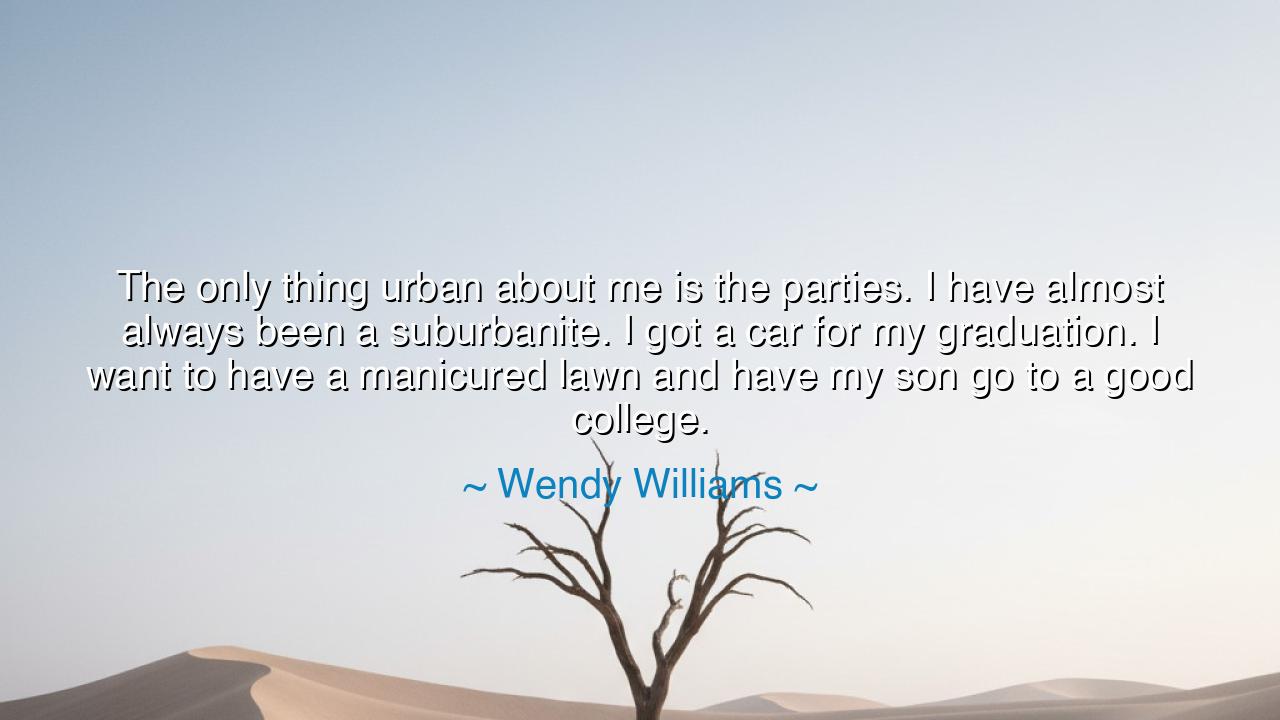
The only thing urban about me is the parties. I have almost
The only thing urban about me is the parties. I have almost always been a suburbanite. I got a car for my graduation. I want to have a manicured lawn and have my son go to a good college.






Hear, O listener, the words of Wendy Williams, both humble and revealing: “The only thing urban about me is the parties. I have almost always been a suburbanite. I got a car for my graduation. I want to have a manicured lawn and have my son go to a good college.” At first, these words may seem a mere confession of lifestyle — simple, grounded, even mundane. Yet, within them lies a deeper truth about the yearning of the human spirit: the desire for belonging, stability, and the peace that comes from building one’s own corner of the world.
The meaning of this quote rests not in the material things it names, but in the dream it evokes — the ancient and universal dream of home. The speaker, Wendy Williams, a woman known for her bold voice and commanding presence, speaks here not as a celebrity, but as a soul who longs for the ordinary beauty of order and comfort. The manicured lawn, the car for graduation, the hope that her son might go to a good college — these are not luxuries of vanity, but symbols of continuity, of a life that seeks peace in the midst of chaos. In her words, we hear the eternal wish of every parent, every wanderer, every heart weary of uncertainty: to plant roots, to cultivate safety, to pass on something better to the next generation.
The origin of this reflection lies in her own story — a woman born in the pulse of urban life, surrounded by the relentless hum of ambition, yet yearning for the serenity that lies beyond it. She admits, “The only thing urban about me is the parties,” not to reject her past, but to declare her evolution. She has lived amidst the bright lights and noise of the city, but her soul, she confesses, belongs to the quiet rhythm of the suburbs — a place where time slows, where dreams take domestic form, where life becomes a garden rather than a stage.
Consider, O seeker, the tale of Cincinnatus, the Roman farmer who was called from his plow to serve as dictator in a time of crisis. He led his people to victory, restored the state, and then — unlike so many — returned to his fields. When asked why, he replied that no power could tempt him away from the peace of his farm. In the same way, Wendy Williams’ longing for a manicured lawn is not small-minded, but profoundly human. It is the desire to return to simplicity after wrestling with the vastness of the world. Even the mightiest crave the quiet soil where they may rest their weary hearts.
Her car for graduation is a symbol too — not of privilege, but of movement, of stepping into life’s next chapter with hope. Every young person dreams of such a moment, when the open road calls, and the future gleams like sunlight on metal. It is the dream of autonomy, of taking control of one’s destiny. Yet, her reflection also carries the wisdom of restraint. She does not speak of conquering empires or chasing fame, but of building a life of purpose — where family, education, and peace matter more than applause.
In her voice, there is an echo of all who seek balance between ambition and contentment. For to dwell in the suburbs, metaphorically or literally, is to choose moderation — neither the wildness of unbounded desire nor the emptiness of withdrawal, but the middle way of cultivation. It is where life is lived in rhythm with the seasons, where joy is found not in endless striving, but in the care of small, sacred things — the home, the child, the garden, the self.
Let this be your lesson, O listener: do not mistake simplicity for weakness, nor comfort for complacency. There is strength in building peace, in choosing steadiness over spectacle. To desire a manicured lawn and a child’s education is not to abandon greatness, but to redefine it. For the truest victories are not those won in public arenas, but those kept quietly — in the love of family, the dignity of work, and the daily tending of life’s garden.
So go forth, as Wendy Williams did, knowing that it is no small dream to wish for peace. Whether you dwell in the city’s roar or the suburb’s hush, let your heart be a home that you keep with care. Seek not the loud triumphs of the world, but the silent triumph of fulfillment. For the wise know that greatness does not only build towers — it also plants roots.






AAdministratorAdministrator
Welcome, honored guests. Please leave a comment, we will respond soon